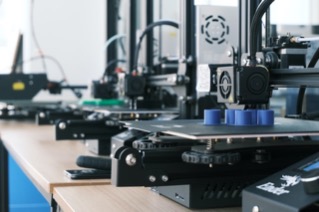Dr. Linh C. Nguyen is the Founder of SIPMD, which seeks to revolutionize health care outcomes for patients in Arizona. Below, Dr. Nguyen explains how digital transformations in medical practice are becoming more widely adopted, and how that’s a good thing for patients.
Dr. Nguyen says the big news in recent technological advancements involve:
- Use of artificial intelligence in group homes and assisted living facilities
- An emergence of telemedicine services and a re-emergence of in-home care
- A push for digitization to prevent future pandemics
- A 3D printing rise in healthcare
Use of Artificial Intelligence Increasing in Home Health
Artificial intelligence is proving its value in early diagnosis and prediction, according to Dr. Nguyen. Machine learning models can look at large sets of data like age or condition and point out which patients are on track to develop diseases even before their symptoms manifest.
Beyond this, artificial intelligence is moving out of theory and
finding its place in hospitals and homes to track, monitor, and potentially flag major conditions.
The University of Massachusetts Amherst and Brigham and Women’s Hospital announced on November 1 that the Massachusetts AI and Technology Center for Connected Care in Aging and Alzheimer’s disease would be opening. This project, MassAITC, intends to improve in-home healthcare that is more difficult with the challenges that Alzheimer's patients have.
Hospitals and other healthcare facilities are shifting to use artificial intelligence to overcome issues that bring healthcare to home, especially with more advanced illnesses. Dr. Nguyen says another example of this is the announcement by Amazon of Alexa Smart Properties that are optimized for assisted living centers.
These technologies are expected to expand in the future, shifting from speaker systems like Amazon Echo to wearable smart home devices to assist with senior living.
The Emergence of Telemedicine Services and a Re-Emergence of In-Home Care
While virtual care services were available before COVID-19, the pandemic did its part in catalyzing a major shift to digital health checkups. It was during this time that technology took center stage for things like:
- Routine health visits
- Mental health services
- Non-emergency care
This increase was so drastic that nearly one-third of adults intended to use telemedicine services at the beginning of 2020. Instead of declining as everything began to reopen, patients have found value in the use of telemedicine services.
These are more accessible for many, including:
- Parents that need to bring children along with them
- Disabled persons
- Remote living persons that do not have a healthcare center nearby
Dr. Nguyen notes that telemedicine is beneficial for healthcare providers as well, saving them in-office costs as well as time and effort on sanitizing between visits. This cost savings can be passed on to patients, and the savings are compounded with the lack of travel time required and the minimal time off work.
The Push for Digitization to Prevent Future Pandemics
The opening keynote for the first day of the HIMSS21 Middle East conference discussed the challenges involved in transforming health care systems to a stronger digital focus.
On this panel the General Director of NHIC (KSA) Waleed AlBahli used the opportunity to speak on how technology can be used to overcome current challenges, highlighting how it enabled a fight against COVID-19 recently.
The discussion turned to the financial sustainability of healthcare, noting that healthcare service prices are on the rise due to a shortage of healthcare workers and a system that is over-encumbered with patients suffering from chronic disease.
While technology allows us to recognize more health issues, it must also be allowed to advance the treatment process says Dr. Nguyen.
During this keynote panel, the idea that digital services allowed for faster and more efficient connections was discussed. Widespread digitization of services would allow better access to information, leading to better care overall.
Dr. Nguyen says that digital services like telemedicine or online databases would allow patients to find services with little to no hurdles at a price that is more palatable for many budgets. Digitization works well with most remote, rural, or migrant demographics, and it would lead to better indicators of past, current, and future health issues.


The Rise of 3D Printing in Healthcare
While 3D printing is not a new digital technology available to healthcare, it was not until the price of 3D printers began to decrease that it became a serious contender for healthcare. The lower cost allows for reduced healthcare costs that can be more effective and less invasive than other methods.
Tools and instruments designed and constructed with 3D printing technology can be optimized for
decreasing operation time and improving accuracy. These instruments have a better chance of being constructed with a perfect balance between size and weight without losing function.
Prosthetics that use 3D printing are also a major advancement for affordability. This is especially important when it comes to more expensive bionic models or fitting children with prosthetics they will undoubtedly grow out of soon.
This same idea applies to 3D printed implants like those for the knees and spine. Digital advancements with EBM technology and 3D printing have transformed how implants can be made, allowing for better mimicry that leads to a higher percentage of osseointegration than earlier methods. Dr. Nguyen says to keep an eye out for more developments from this emerging field.

